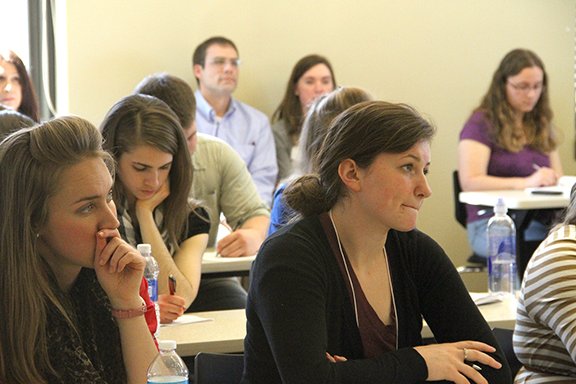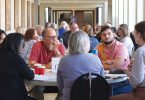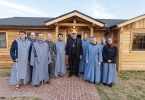
Benedictine College students Michela Brooks, left, and Rachel Wemhoff, listen to a speaker at Benedictine College’s Institute for Missionary Activity’s Symposium on Advancing the New Evangelization. The two-day event, included Archbishop Joseph F. Naumann; Bishop Robert C. Morlino, bishop of Madison, Wis.; Dr. Jonathan Reyes, executive director for the U.S. Conference of Catholic Bishops’ Department of Justice, Peace and Human Development; and Curtis Martin, president and founder of the Fellowship of Catholic University Students.
by Laurie Ghigliotti
ATCHISON — “This symposium comes just in the nick of time,” said Tom Hoopes in his opening remarks at Benedictine College’s Institute for Missionary Activity’s Symposium on Advancing the New Evangelization April 5-6.
“Attacks on religious freedom have reached a fever pitch,” he added.
Hoopes, director of the college’s Gregorian Institute, was addressing over 200 participants gathered to discuss the symposium’s theme, “Building a Culture of Freedom.”
Archbishop Joseph F. Naumann was among the presenters. He was joined by participants, presenters and keynote speakers from as far away as Wisconsin, Texas and Washington, D.C. The archbishop celebrated Saturday’s vigil Mass for symposium participants in the Our Lady of Guadalupe chapel at St. Benedict’s Abbey.
David Trotter, director of the Institute for Missionary Activity, noted that for over four decades, the popes have called Catholics to join in a new evangelization.
“The idea [for the symposium] is to create an interdisciplinary dialogue between professors, college students and professionals to gain more insight on how to carry out the new evangelization in all aspects of life,” he said.
“The symposium combines academics with best practices in the field — the idea is that professors can better inform those in the field academically, and those in the field can better inform professors on what is being effective and successful in the new evangelization.”
The symposium’s schedule permitted attendees to choose from among dozens of presentations, including ones on the HHS mandate, end-of-life issues, jurisprudence, education, literature, theology, evangelization, bioethics, social media, marriage and family life, public policy and American politics.
Keynote lecturers included Bishop Robert C. Morlino, bishop of Madison, Wis.; Dr. Jonathan Reyes, executive director for the U.S. Conference of Catholic Bishops’ Department of Justice, Peace and Human Development; and Curtis Martin, president and founder of the Fellowship of Catholic University Students and consulter to the Pontifical Council for the Promoting of the New Evangelization.
The symposium began Friday evening with Bishop Morlino’s keynote lecture on bioethics in today’s climate of shifting definitions and rapidly advancing technology that distracts society from central truths such as the sanctity of life.
Bishop Morlino spoke about the difficulties of effectively communicating the church’s position on controversial topics like same-sex marriage, contraception and reproductive technology, and end-of-life issues.
He suggested that appealing to the human desire for beauty could be key to solving the communication difficulties when the church and its members get shut out of the dialogue.
“The world doesn’t want to hear about truth or moral goodness,” Bishop Morlino said. “But maybe beauty has a chance.”
“Beauty needs to be explored as a vehicle for evangelization,” he added.
Beauty and freedom are tied together, the bishop said. “Freedom is accountable to . . . the beauty of the creative plan of the Father, Son and Holy Spirit — also known as natural law.”
The seemingly unsolvable cases in which the possibilities of advancing technologies clash with Catholic teaching are, the bishop stated, a product of relativism and a forgetfulness of beauty and of the fact that human beings are a unity of body and soul.
In-vitro fertilization is a case in point.
“Technology has become lord and master,” said Bishop Morlino. “If we can do it, we must. [However], technology’s lack of concern for the beauty of the ecology of human nature is where the problems come from.”
From this arise dilemmas like the plight of frozen embryos, the fate of which wind up being decided by the courts.
“The problem of frozen embryos is not a question for a court of law,” said Bishop Morlino. “God has already answered that.”
Bishop Morlino extended the idea of beauty into the area of politics as well, where decisions are made about what can be done with technological advances.
“In the absence of beauty, people vote to satisfy their instincts,” he said. The end result is government officials who ignore or have forgotten the reality of the beauty in natural law.
“We do bioethics because we want to keep beautiful the beauty of human nature,” the bishop said.
Curtis Martin, president and founder of the Fellowship of Catholic University Students, presented his paper “Freedom and the Evangelical Imperative” as the Saturday morning keynote. In his lecture, he spoke about the obstacles to evangelization and the steps needed to overcome them.
“Our greatest impediment is us,” said Martin.
A lack of training and the fact that we, as Catholics, do not experience our faith as good news are two impediments to evangelization, said Martin.
“Lay Catholics have been on the receiving end [but, until now,] have never been called on to give,” he noted.
“The harvest is ripe,” said Martin. “What we are lacking are workers.”
Martin also made a distinction between evangelization and catechesis.
“Catechesis feeds a desire to know,” Martin said. Evangelization, however, is a call for conversion, which precedes the desire to know. Attempting to catechize people who have not been evangelized is counterproductive. People must be seen as children of God first, Martin said. Evangelization is not just trying to get them to behave.
Archbishop Naumann, in his homily, spoke about the need for evangelization by laypeople in every age.
“None of us is given the faith to keep it to ourselves,” he said. “We are all sent in mission. Our mission is to go and make disciples.”
He also acknowledged the difficulties.
“Our task is to make disciples in a society that has tired of Jesus,” said Archbishop Naumann.
Jonathan Reyes brought the symposium to a close with his thoughts on evangelizing in this moment in history in a way that addresses the poverty of the West, a hunger for love and for God.
Citing the fascination of the media for Pope Francis, Reyes spoke about the opportunity that has made itself apparent.
“There’s something authentic that they’re looking for and they see it in Pope Francis,” he said.
Reiterating Martin’s observation that one has to earn the right to be heard, Reyes said that Pope Francis has done just that in his care for the poor and vulnerable as a bishop and now as pope.
“There’s a consensus that you look out for other people,” Reyes said. “Pope Francis brings witness to that, and the world is curious about it.
“Our witness — done right, in the service to the poor and vulnerable — could be one of the keys to unlocking evangelization in an amazing way,” he concluded.






